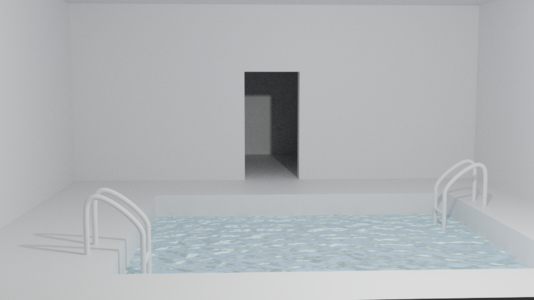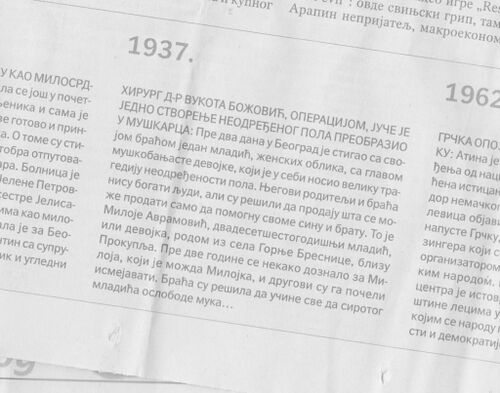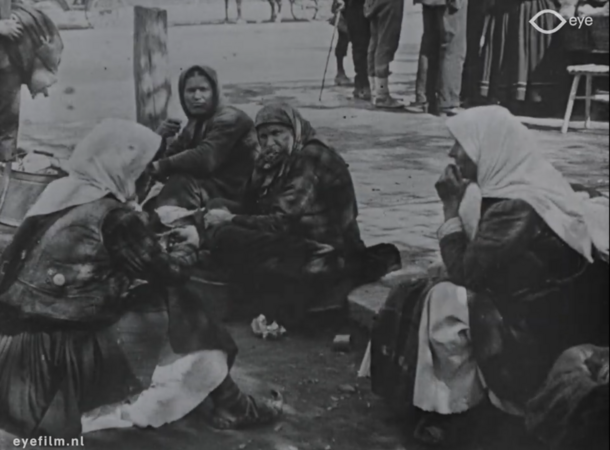User:Senka/a bas nije da nas nikad nije bilo
квир истраживања све овде бацамо ајде идемо
Meetings with Ana Milić
- her reseach on post-yugoslav queer and migrant oral histories
- the things we've discussed in the interview
- resources she shared with me:
LIST SOURCES
Research questions
- What would be a queer Balkan history, what has been forcefully forgotten along the way?
- Which forgotten queer Balkan histories would help us imagine the future differently?
- How could one dig up what has already been there, queer and hiding in plain sight, to counter the narrative of queerness being something that is inherently Western?
- More broadly how can one counter homo nationalist queer narratives that posit the west as a the source of queerness and other country as a source of backwardness?
- What do a local queer culture and a queer vocabulary look like when they are not forcefully copy pasted from western queer pop culture?
- How has the conception of national identities influenced the attitude towards queer identities?
- How can (3d/immersive) fictioning from archival gaps and remains allow for new political imaginaries of queer futures?
- Šta se može uraditi kako bi se izašlo iz ćorsokaka koji pozicionira LGBT pitanja kao stvar evropejstva? I stoga kao pitanja tuđa lokalnom kontekstu? — translation: What can be done to get out of the one way street in which LGBT questions are considered a marker of Europeanness? And therefore other to a local context? — taken from an article from Post-yugoslav TRANS
Research Methods
Reading(s)
- comparative reading (texts and games predominantly)
- organising reading clubs (last block of rrc is dedicated to queer time, community and liberation, as well as addressing homonationalism and pinkwashing genocide)
Making Research
- prototyping small games and unstable archives
- testing prototypes
Conversation-based
- conversations / interviews
- imagining exercises / collective narrative building
Scavanger method
- post a definition here
3D explorations
Liminality
Previous readings that posit the Balkans as a place that could not self identify, but is liminal because it was identified by larger global forces.
Pool
I wanted to get a bit better at making scenes (lighting, textures, etc) so I modeled and rendered a pool.
I followed this tutorial by intranet whom I love >>>[1]
About 3D world building:
What I've realized so far: there is no critical fabulation (about queer histories) through 3D models without contradiction. THe narrative, in this case the 3D models, have to embody contradiction.
Printers
Inkjet
Dot Matrix
Receipt Printer
Manetta told me the ink from receipt printers is toxic, to the point that some cashiers in certain countries wear gloves when they handle them.
Could be an interesting thing to play with.
Mini Thermal Receipt Printer
Hacking the printer to print without the proprietary app. [ADD code here and link to the git page]
Ideally, as you go through the game the thermal printer would print parts of the archive and you could put them as stickers in a passport
Games
With Alessia, Thijs, Victor, Lorenzo and Bernadette we have a little group for meeting up, talking about, sharing and playing games. This is the pad > https://pad.xpub.nl/p/games
Text Adventures, Choose your own adventures, Non-linear storymaking
Special page for this > [2]
Godot
Alessia and I made a page dedicated to learning Godot and sharing what we've found> [3] There's exporting instructions, troubleshooting etc
Godot test
Page for Godot Debugging
Things I've worked on in Godot so far:
- 3D platformer movement (GUI controls)
Worked really fine
- Blender models:
To be done:
- Integrating textures
- Fixing lights
What worked so far especially was adjusting the model in blender by adding to mesh copies <colonly> so it's apparent that it's a collision surface and the character should not fall through.
- Audio added to objects
My concern here was that it won't be able to be integrated online but it works perfectly fine!
- Portals to different rooms
This needs a lot of reorganizing of the code for it to work... Currently stuck at trying to delete one room once there has been a switch from another (queue_free function not working).
- Text:
Rich text label
Issues with this label, it offers a lot because of the bb code, but harder to integrate. Initially I wanted to use it as running text, but I've realized just how much text there is to integrate.
Label Node
Easier to integrate than rich text but doesn't have anything like bb code.
Label 3D
I thought Label 3d would be a good way to sneak in more text into the 3D model in such a way that it would be positioned spatially. But this text is not rendered very sharply, and really is built for looking up close. So integrating a lot of text there doesn't make sense.
The question of text is super important, I still have to decide what way I should integrate text-----
Some ideas are:
- text integrated in the 3D model (as 3D labels) or as textures (Blender)
- text as a narrator speaking it to the player (audio)
- interaction based pop ups
- running text (with the rich text label as it's doing it now)
- Menu Items: Popup windows
Window pop up wasn't getting styled until I enabled embedded subwindows in project settings.. Important to remember: Margins need to be expanded at least 30px for it to work [4] + Embedded windows in project setting must be on!!
Current test can be accessed at> [5] <
ADD IMAGE
The history
So far I've looked into:
Pagan / pre-christian times
- crop season leaving the stock
- honey liquor
- burning the dead
- placing an axe in front of the door
- the arrival of Christianity [citation for мужелоштво]
Ottoman empire times
Virdžine
Lali Rapiki
Not the source I was looking for but it will have to act as a placeholder for now >> [[6]]
Additional [[7]]
Film Virdžina
[[8]]
Yugoslavia
Kingdom of Serbs, Croats and Slovenes (1929–1941)
Things I've found:
An article describing the journey of a young person in search of a sex reassignment surgery. There have been speculations that this person is trans or intersex [Senka provide citation].
Link to source >
[[9]]
ADD Photos of the full source
One of the videos of the Eye Filmmuseum archive’s publicly accessible Youtube collection became the digging ground for a case study due to it’s unfolding comment section about the past and present political imaginaries. It’s a 1920s video of ‘peripheral’ Europe, more specifically the Kingdom of Serbs, Croats and Slovenes, which encompasses the modern territories of Slovenia, Croatia, Montenegro and Serbia. This film was recorded from a Dutch lens of the perceived oriental Balkans and the act of sharing it four years ago on Youtube caused an avalanche of debates about the political, cultural and social predicament of the region. Many commentators didn’t resist the urge to read into the archival footage, read the lips of the silent film actors, ascribe intent, and correct perceived wrongs in how the land was described. While some went as far as to imagine collectively—in the margins of the comment section—what the people did once the camera was off, or they had walked out of the frame. Due to this we had to investigate this video as a site of how knowledge is produced in the margins of the archive.
Link to source >
[[10]]
Socialist republic
Sandžak Partisan
[to explain and cite]
Josip Mardešić
[to explain and cite]
Link to resource> [[11]]
Dispersal
Being gay being criminalized but transness not. The different times that homosexuality was decriminalized in the Balkans.
Queers joining anti war activist and letting queer rights take a back seat for now [cite!]
The trans woman from Kosovo that moved to Ljubljana [cite!!]
Merlinka
Film Dupe od mramora, in English Marble Ass
Songs
Queer songs from the yugo times:
[[12]]
Post-yugo time
Srbija
Song:
Senidah — Slađana
Nil mentioning his HRT costing only 50 cents.
Zoran Đinđić's assassination
Mile VS Tranzicija (economic transition, the stereotype of being a педер: eating vegetables, piercing an earing and becoming a педер)
My own passport photo from 2015 and continually being stopped at the airport because "I don't look like my passport photo/ This is not my passport/ me etc"
Nil's experince of people using the formal you as to not gender him or rather misgender him.
People thinking queerness is inherently Western [cite!]
My own experience of talking using an archaic tense (aorist) to avoid gendering the verbs. The implication of this are that I exist in this tense only for a short period of time in the past.
Who's to blame
So far I've found quite a bit which seems to be a layer upon layer of blame. During the ottoman empire, queer practices were seen as a violent ottoman legacy, that was enforced through rape and abduction. In the beginning stages of communist uprising, queerness was perceived as a sign of the bad influence of the bourgeoisie. As far as the pre-christian era, there is little to nothing to be found on this topic. Generally, records are scarce, and the Balkans was never a region preoccupied with record-keeping (unlike colonial powers).
So what now, when I've combed through, and mostly found violence and blame of larger forces for the existence of people who are everywhere around the world.
There is also something to be said about the fact that queer as an identity came way later, in the past it was often seen as a thing that happens, rather than a thing that you are, an identity..
Different ways to interact with a screen
Ideas
Презентација у дрегу?
Tangents
- liminality on deciding on a region
On Untranslatability
I think in (some) Slavic languages you just cannot write in the academic style or fashion of canonical queer theorists. Judith Butler writing gender is performative is something I cannot put in words in Serbian without it sounding like it was google translated (at the time of writing this, google translated is used as a synonym to mean poorly) but my friend Nat, to the question of how to address them since we do not have adequate pronouns for them in Serbo-Croatian, responds 'Дај шта даш' (literally "Give what you give", meaning give what you can afford to give) conveys a similar energy.
I'm really thinking along this idea that the guy from Slavs and Tatars voiced in one of their lectures (it might be tranliterated tease but I have to doable check). He explained that the reason Russia does not have notable philosophers is because the fiction writers are philosophers, they occupy many roles and embed them in fiction. And I think this is more broadly true of Slavic languages imho.
On Response-ability for archival narratives or lack there of
I'm going to archives as a place of difficulty, as a troubled place, as a site of the production of history, as a place where a different future could be imagined.
For queer Balkan people what does this mean? If the archives are mostly filled with absence in regards to them, or worse, with violence? What now? Do we trust this evidence, or do we trust the sanctity of our own communities?
Living in the west I feel like it is my responsibility to fight homonationalism, as this belligerent othering of non western cultures under the pretense of homophobia or transphobia.







